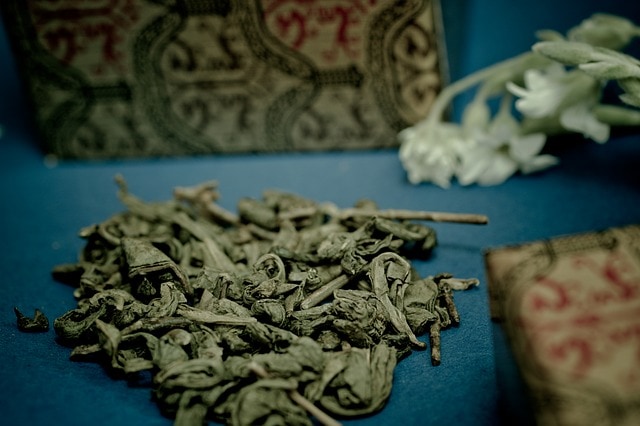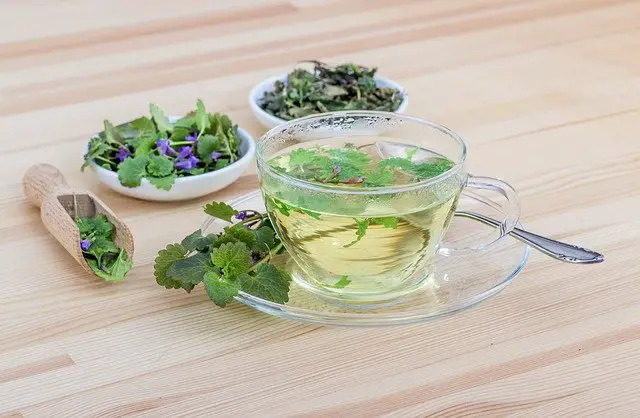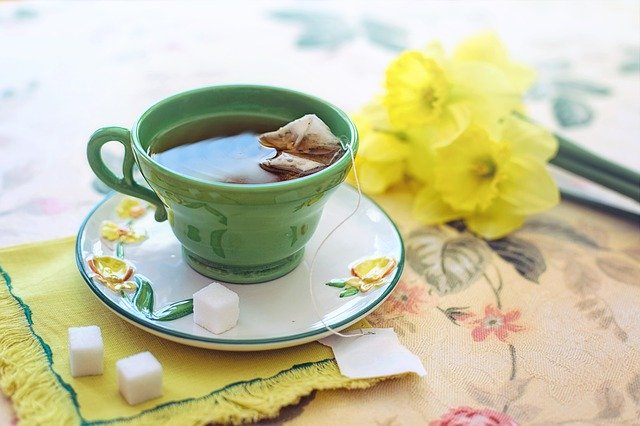
There is some confusion regarding green tea and whether or not it can be classified as a herbal tea.
Now, this mix-up is understandable. Green tea often looks, smells, and even tastes like a herbal brew.
However, if you want to get to the bottom of this mystery, you should check out the information below…
Contents
First things first, can green tea be classified as a herbal brew?
No, it cannot.
This is because green tea belongs to a family known as true teas.
Herbal tea doesn’t belong to this category.

Let’s dig a little deeper into this matter – what is a true tea?
Well, true teas are those that are derived from the plant Camellia sinensis.
It is this plant that gives you green, white, black, and oolong tea.
The main differences between these true teas is the manner in which they are processed.
For instance, white and green tea is less processed than oolong and black tea.
So, then, what is herbal tea?
In reality, herbal tea is an umbrella term.
It is used to describe infusions that are made from leaves, flowers, stems, and roots of plants that aren’t the tea bush.
A more accurate term for this would be tisanes.
Some of the most common herbal teas include chamomile, ginger, peppermint, rooibos, and lemon balm.
Related Article
How to Make Ginger Tea: A Guide to Brewing the Perfect Cup
Let’s take a closer look at how green tea and herbal teas actually differ:


The exact flavor profile of green tea will often depend on how it is grown and processed.
High-quality green teas tend to have a sweeter taste, while low-quality ones may have a grassy or bitter edge to them.
Some terms that may be used to describe the flavor profile of green teas are: vegetal, floral, fruity, and even nutty.
It is impossible to narrow down the flavor of herbal teas as they can be made from a large variety of plants.
Thus, certain flowers and roots may have sweeter notes while leaves may be slightly bitter.
If a tea is made from cinnamon or turmeric, there is sure to be a spicy kick to it.
One of the reasons that people drink both green tea and herbal teas is for the health benefits.
So, how do these brews stack up?
Well, green tea does have an advantage here. Green tea like other true teas has a higher concentration of antioxidants.
As such, it is associated with the prevention of certain cancers and reduce the risk of cardiovascular diseases.
It is also hypothesized, that green tea can protect the brain and even help to prevent certain neurodegenerative disorders.
There is evidence to show that green tea can help to burn fat and fuel weight loss.
Related Articles
Brewing for Beauty: How to Enjoy Green Tea Skin Benefits
Sip the Pounds Away: Your Guide to the Best Green Tea Brands for Weight Loss
So, what about herbal teas?
Well, as mentioned, there are numerous types of herbal teas. And, each of them have their own properties.
As such, their advantages can vary quite a bit as well.
For instance, chamomile tea is known for its calming properties and may help with reducing complications associated with diabetes.
Rooibos tea, on the other hand, may be effective at fighting cancer.
It should be noted that herbal teas haven’t been researched and investigated nearly as much as true teas.
Due to this, it is difficult to confirm just how many beneficial properties any particular type of herbal tea may have.
For the most part, green tea is quite safe.
As such, a wider variety of people are able to enjoy the health benefits associated with this tea.
Nevertheless, you should be cautious of consuming green tea in high doses.
As with the case of all true teas, green tea contains caffeine.
So, if you drink too much green tea, you may experience side effects that are linked to caffeine.
Related Articles
Stay Calm and Sip On! Here’s Your Guide to the Best Decaf Green Tea
These include, but aren’t limited to headaches, anxiety, sleep issues, stomach problems, irritability, and irregular heart rate.
Moderating your intake of green tea can go a long way in reducing the risks of these symptoms.
Most herbal teas don’t contain caffeine and so this isn’t something that you need to be concerned about.
However, it can be tricky to narrow down specific contraindications of herbal tea.
This is largely due to the fact that each tea can be rather different to one other.
At the same time, there is a limited amount of research done on these brews.
This doesn’t mean that herbal teas don’t have their own side effects, however.
Most experts will warn you to be careful when consuming herbal teas.
In some instances, scientists have found compounds such as pyrrolizidine alkaloids and safrole in these teas.
They have been known to be harmful, particularly in higher doses.
Due to this, it is important to carefully research each and every herbal tea that you may want to try.
This could help to reduce the risk of any side effects.
And, if you do notice any adverse effects after consuming a particular herbal tea, make sure to cease consumption at once.
If you are currently taking any kind of medication or have been diagnosed with a persisting medical condition, you should take additional caution.
Also speak to your doctor first before drinking a particular kind of herbal tea.
There is a chance that the tea may negatively interact with medications or exacerbate symptoms of a medical condition.
Let’s take a look at how you would prepare green tea and herbal tea.
Now, for the most part, both green teas and herbal teas are prepared using a process known as infusion.
This is where the green tea leaves or herbal flowers and leaves would be added to hot water.
They are kept there for a specific period of time and then the leaves and flowers are strained out.
In the case of green tea, you should allow the leaves to steep from 1 to 4 minutes.
With herbal leaves and flowers, the steeping time could be from 15 minutes to 24 hours.
Of course, some herbal teas are brewed from hardier parts of the plants such as stems or roots.
Due to this, they need to undergo a slightly more intensive process. This is called decoction.
Here, the plant materials are allowed to simmer in the water, often for an extended period of time – sometimes even hours.
This allows the healthful elements of the stems or roots to be fully transferred to the water.
To summarize, green teas and herbal teas don’t really have too much in common. However, in appropriate doses, they should contain a number of health benefits for you.
As such, drinking either green tea or herbal tea could be equally useful to you, depending on your requirements.
Did you enjoy this post? If so, you should head over to our Pinterest page. Here you can find a lot of Pins on green teas, herbal teas, and a whole lot more!
